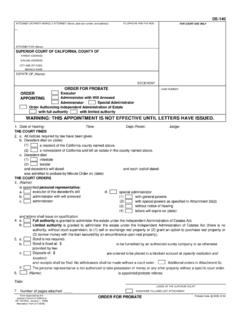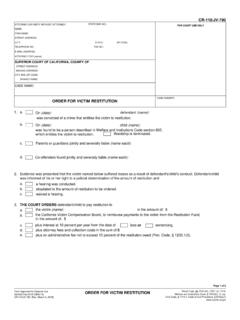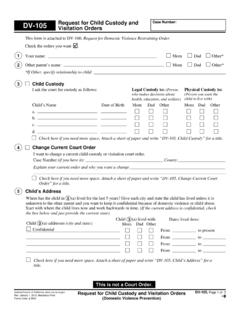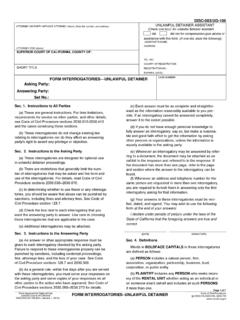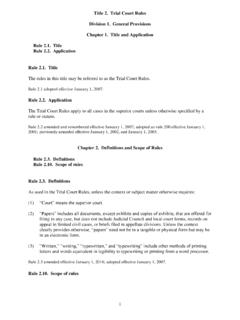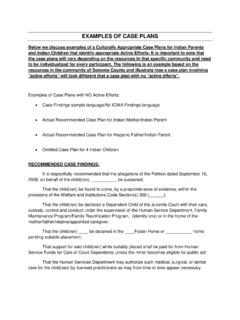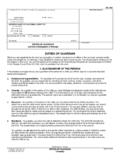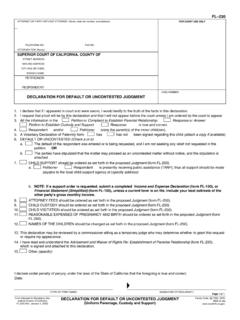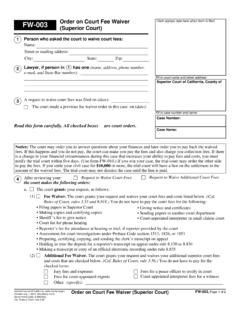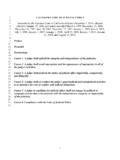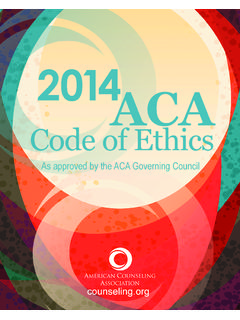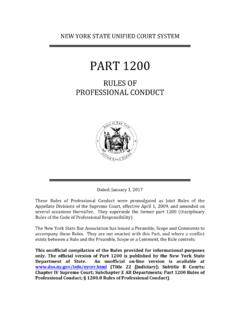Transcription of Professional Standards and Ethics for California Court …
1 Professional Standards and Ethics for California Court Interpreters FIFTH EDITION, MAY 2013 Professional Standards and Ethics for California Court Interpreters FIFTH EDITION, MAY 2013 judicial Council of California Court Interpreters Program 455 Golden Gate Avenue San Francisco, California 94102-3688 Copyright 2008 by judicial Council of California . All rights reserved. Except as permitted under the Copyright Act of 1976 and as otherwise expressly provided herein, no part of this publication may be reproduced in any form or by any means, electronic, online, or mechanical, including the use of information storage and retrieval systems, without permission in writing from the copyright holder.
2 Permission is hereby granted to nonprofit institutions to reproduce and distribute this publication for educational purposes if the copies credit the copyright holder. This manual is also available online at: . For more information or to request hard copies, please contact the Court Interpreters Program at 866-310-0689 or Contents Acknowledgments iv Ethics Defined v Preface vi Representation of Qualifications 1 Complete and Accurate Interpretation 3 Additions 3 Omissions 5 Changes in Meaning 6 Register 7 Idiomatic Expressions 7 Fragmentary Statements 9 Voice Tone and Emotional Overtones 10 Nonverbal Communication 11 Ambiguities 12 Double Negatives 12 Read-Back and Repetition of Question or Reply 13 Errors 13 Clarification of Unfamiliar Terms 15 Culturally Bound Terms 15
3 Repetition of English Used by Witness 16 Questions From Witness 16 Identification of Interpreter s Statements 16 Challenges to Interpretation 17 Duty to Witness 17 Impartiality and Avoidance of Conflicts of Interest 18 Conflicts of Interest 18 Appearance of Bias 18 Parties in the Case 18 Prior Involvement in the Case 19 Gifts and Gratuities 19 Interpreter Neutrality 20 Personal Opinions 20 News Media and the Public 21 Confidentiality 23 Attorney-Client Privilege 23 Prosecutor-Witness Interviews 23 In Camera Hearings 23 Grand Jury Proceedings 24 Juvenile Proceedings 24 Evidentiary Materials 24 Giving Legal Advice 26 Questions by Defendants 26 Questions by Witnesses 27 Questions by Family and Friends of Defendants or Witnesses 27 Referrals 27 Professional Relationships 28 Interpreter as Officer of the Court 28 Unobtrusiveness 28 Continuing Education and Duty to the Profession 29 Continuing Education and Work Requirements 29 Familiarity with the Case 30 Technical Terminology 30 Jury Instructions 30 Disqualification 31 Use of Technology
4 31 Relations with Colleagues 31 Professional Organizations 32 Assessing and Reporting Impediments to Performance 33 Interpreter Fatigue 33 Team Interpreting 33 Audibility 34 Instructions to Parties 35 Instructions Not to Interpret 35 Documents and Sight Translation 36 Cultural or Linguistic Expertise 36 Duty to Report Ethical Violations 38 Appendix 39 A. California Rules of Court , Rule 40 B. California Evidence code Sections 750 43 C. California Standards of judicial Administration, Standards and 49 D. Standards for Performance and Professional Responsibility for Contract Court Interpreters in the Federal Courts 53 Supplement 55 Compliance Requirements for Certified Court and Registered Interpreters Acknowledgments Thanks are due to the following individuals for their contributions to the development of this manual.
5 Holly Mikkelson, Associate Professor, Graduate School of Translation & Interpretation, Monterey Institute of International Studies, authored the original version of this manual. Julie Johnson, Assistant Professor, Graduate School of Translation & Interpretation, Monterey Institute of International Studies, together with Ms. Navar, conducts the judicial Council s Professional Ethics training workshops for Court interpreters using this manual. Both of them are primarily responsible for the updates in this new edition. Genevieve Navar, Federal and California certified Court interpreter in Spanish and California registered interpreter in French, together with Ms.
6 Johnson, conducts the judicial Council s Professional Ethics training workshops for Court interpreters using this manual. Both of them are primarily responsible for the updates in this new edition. Lucy Smallsreed, supervisor of the Court Interpreters Program, judicial Council of California , contributed further updating, reformatting, new materials for the appendix, and content review. Anne Marx, Court services analyst for the Court Interpreters Program, judicial Council of California , reviewed and corrected the final draft, confirmed the references, and coordinated production. Christopher Bernard, editor for the Editing and Graphics Group, Office of Communications, judicial Council of California provided a thorough and thoughtful edit of the document.
7 Cannon Han, former senior Court services analyst for the Court Interpreters Program, judicial Council of California , coordinated and edited early versions of the fourth edition. iv Ethics Defined The American Heritage Dictionary of the English Language, Fourth Edition (Boston: Houghton Mifflin Company, 2000) defines Ethics as the study of the general nature of morals and of the specific moral choices to be made by a person; moral philosophy and the rules or Standards governing the conduct of a person or the members of a profession. In the context of Court interpreting, a code of Ethics protects the interpreter and lessens the arbitrariness of his or her decisions by providing guidelines and Standards to follow (S.)
8 Neumann Solow, Sign Language Interpreting: A Basic Resource Book, revised edition (Silver Spring: Linstock Press, 2000, p. 50). v Preface This manual is intended to inform interpreters of their Professional and ethical responsibilities so that they are better able to deal with the difficulties that commonly arise in matters involving non-English-speaking parties in the judicial system. It also serves as a reference and springboard for discussion in conjunction with the judicial Council Ethics Workshop, which is provided as an integral part of the education and certification or registration of Court interpreters in the State of California .
9 In addition to the regulations and recommendations provided here, it is important to note that different courts have their own rules and ways of conducting business. It is the interpreter s duty to learn and follow these rules as well. In the courtroom, the judge is the final arbiter of what is appropriate. The more prepared and informed you are about Professional practices and the purpose of established norms and principles, the more you, together with all officers of the Court , will be able to further the interests of justice. This manual is based largely on the rules and principles set forth in rule of the California Rules of Court ( Professional conduct for interpreters , see appendix A); California Standards of judicial Administration adopted by the judicial Council of California for interpreted proceedings (Standard and Standard ; see appendix C); the Standards for Performance and Professional Responsibility for Contract Court Interpreters in the Federal Courts (see appendix D) and W.
10 E. Hewitt, Court Interpretation: model Guides for Policy and Practice in the State Courts, Publication R-167 (Williamsburg, Virginia: State Justice Institute, 1995). viRepresentation of Qualifications 1 Representation of Qualifications The judicial Council has established specific categories of Court interpreters as well as procedures for qualifying interpreters. The judicial Council directly certifies and registers spoken-language interpreters: A certified interpreter is a spoken-language interpreter who has passed the Bilingual Interpreting Exam and fulfilled the corresponding judicial Council requirements.
